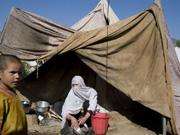Islamabad, 26 January, 2010 - MSF deeply shocked by sudden forced evacuation of 7,000 displaced people in the Lower Dir district of North West Frontier Province
Islamabad, January 26, 2010 - International medical humanitarian organization Doctors Without Borders/Médecins Sans Frontières (MSF) is deeply shocked by the forced evacuation of approximately 7,000 displaced people from Munda in the Lower Dir district of Pakistan's North West Frontier Province. On January 25, MSF teams based in Munda learned that armed military personnel were forcibly evacuating families from both the Munda camp for displaced people and the market building where MSF has been working for the past two months.
Since early November 2009, 450 families have been living in this camp set up by MSF. An additional 4,500 people who were staying in a market building were also told they had only a few hours to evacuate. Prior to yesterday’s events, MSF had already been actively looking for adequate land to shelter these families and had already expressed its concerns regarding their extremely poor living conditions.
The order to evacuate came without warning. People were told at midday to leave the Munda camp before 4 p.m. the same day. “We didn’t receive any information about the upcoming evacuation, nor did any other humanitarian organization present in the region or the displaced people themselves,” said Olivier Chenebon, country representative for MSF in Pakistan. “They had four hours to pack up and leave and we were prevented from preparing the transfer of the displaced people.”
Men, women and children were told to head towards Walay Kandow, a 40-minute drive from Munda. The United Nations High Commissioner for Refugees (UNHCR) runs a camp for displaced people in Walay Kandow but there is no facility to provide adequate welcome and shelter for the newly arrived families. “People arrived very late, and had to settle in the dark,” explained Gaetan Drossart, coordinator of the MSF Lower Dir project. “Some slept outside last night and will have to do so again tonight.”
On the morning of January 26, an MSF team arrived in Walay Kandow and saw firsthand the large numbers of people waiting on the road. “They do not know what to do,” said Drossart. “They are asking for water and food, they have almost nothing. The vast majority of these people fled the ongoing violence in neighboring Bajaur Agency and are once again facing a dramatic situation.”
In Munda, MSF assisted these people with access to drinking water, latrines, showers, medical assistance, as well as tents for those staying in the camp. The families from the camp took their tents with them, while the displaced people from the market building ended up in Walay Kandow without any shelter.
“Our priority is to provide water to these people,” said Drossart. “We will bring water here by tomorrow morning and set up a tent to provide primary healthcare as soon as possible.”
MSF is extremely concerned about this critical situation. The area of land allotted to shelter the displaced families is smaller than what they had in Munda. “It was already small in Munda for 450 families,” said Drossart. “Now there are more than 1,000 families in urgent need of proper shelter, access to food and water.”
MSF urges the authorities to find adequate resources to accommodate this vulnerable population.
Since 1998, MSF has been providing medical assistance to Pakistani nationals and Afghan refugees suffering from the effects of armed conflicts, poor access to health care and natural disasters in NWFP, FATA, Balochistan and Kashmir.
MSF does not accept funding from any government for its work in Pakistan and chooses to rely solely on private donations.




